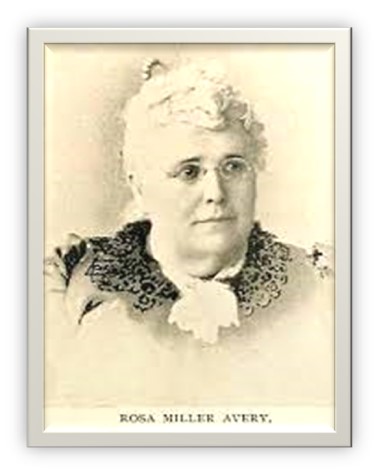
Rosa Mary Miller was an American abolitionist, suffragist, writer, and political reformer. She was born in Madison Ohio on May 21, 1830. Also known as Roseanna Mary Miller, she was the daughter of Nahum (1786 – 1853) and Esther McDonald Miller (1793 – 1875), and grew up on a farm on Middle Ridge Road in Madison Township. She was one of six children of Nahum and Esther (McDaniel / McDonald). Her family, and her roots in Madison, helped shape her views that led her to be such a prolific, noted writer on social questions of the day.
Nahum Miller, the family patriarch, was born in Vermont, son of American Revolutionary War veteran Captain Isaac Miller. Nahum, born in 1786, eventually became one of the first settlers of Madison; clearing a location for a home in the woods of what eventually became Middle Ridge Road. In 1816, he married Esther McDonald, and the Miller farm became “noted for its hospitality to everyone who was in need of assistance or sympathy, as it was for its cattle and blooded stock.” As a child, Rosa was considered a tomboy, and was said to have inherited her love of animals from her maternal grandfather James McDonald (himself an early settler of Ashtabula County). Nahum was a reader of political history, held broad humanitarian views, and was considered a pioneer anti-slavery agitator. Esther is said to have had a strong influence on her children, being credited as saying “the laws pertaining to property and the holding of children were as oppressive for women as for negroes.” The family farm was noted as an Underground Railroad Station stop, which would have shaped Rosa’s views on slavery and abolitionism. As a student at the Madison Seminary, she wrote “stirring anti-slavery essays, which were met with derision and abuse.”
In 1853, Rosa married Cyrus Avery of Oberlin, OH. They lived in Ashtabula for a time and she organized the first anti-slavery society known in the area. According to her biography, “not a clergyman in town would give notice of its meetings”, and because of that, the “leading men of wealth and influence withdrew from their respective churches and built… a brick church that was decidedly anti-slavery.” During the American Civil War, she wrote for various papers and journals on the day, on the Union, and emancipation, using male pseudonyms in order to be taken seriously. Her articles attracted attention and correspondence from then Governor of Illinois Richard Yates, James A. Garfield, and abolitionists James Redpath and Lydia Maria Child. The Avery family, including son Cyrus (b1854) relocated to Erie Pennsylvania for a ten year period. Her husband had been appointed by the Young Men’s Christian Association of Erie as visitor to inmates confined to the city prison. Rosa assisted her husband in his work and became interested in the underlying motives behind criminal behavior. She continued to write, often under the name of “Sue Smith”, for the local Erie newspapers as well as an advice column, on social questions, love, marriage, and religion to high school graduates.
Rosa and her husband moved to Chicago in 1877. There, her writing focused primarily on social purity and suffrage work. Many of her articles and rebuttals to the opponents of franchise for women appeared in the Chicago and national publications, including the Chicago Inter Ocean newspaper, and by then, she had quit writing under pseudonyms. In addition to writing, Rosa was also a polished public speaker, speaking at various suffragist events. Their activities and writings had a profound effect on their son Cyrus, who married Rachel Foster, a suffragist who worked closely with Susan B. Anthony.
Rosa died in November 1894 in Chicago and her body was returned to Madison to be buried near her family in Middle Ridge Cemetery. Her husband Cyrus died in 1907 and he was buried alongside his wife in Madison. Their son Cyrus died in 1919, and he too was interred alongside his parents. Her upbringing by two forward thinking parents, and the opportunity to further her education at the Madison Seminary, helped mold her character and passion for social and political reform. The reverse of the shared headstone of Rosa, her husband Cyrus, and son Cyrus, reads:
Of The Bartholdi Statute
She Exclaimed At The First
International Council of Women
At Washington D.C. 1888
The Idea Of Liberty for Women
Has Become So Prevailing,
So Penetrating, That Even The
Stones Cry Out And Take Upon
Themselves The Form Of
Womanhood And Proclaim
Liberty Enlightening The Whole World
Rosa Miller Avery

Submitted by Jesse Devin, Social Media Assistant MHS
Madison Historical Society Executive Board & Advisors
Cheryl Swackhamer – President
Dianne Cross – Vice President
Donald Bartlett – Secretary
Michael Gehring – Treasurer / Business Manager
Marjorie Shook – Office Manager / Membership Chair
Sherry Carsey – Curator
John Vohlidka – Newsletter Editor
Trevor Behm – Advisor
Richard Collins Jr. – Advisor
Ned Foley – Advisor
David Van Dusen – Advisor
Shane Oravetz – Advisor
Carrie Svigel – Advisor
Jesse Devin – Social Media Coordinator
The Madison Historical Society is a 501(c)3 corporation, and most donations have tax advantages. You can support MHS through making a donation, shopping with Amazon Smile, a tax-free IRA Contribution, or a gift of Stock.
To make a General donation, Memorial donation, or Capital Fund Drive donation to the Madison Historical Society, please complete the form below and make a payment via PayPal using your credit card or PayPal account. If you prefer to send a check, please make it payable to Madison Historical Society and send to PO Box 515, Madison, OH 44057.
Volunteers created the Madison Historical Society in 1978, and have been essential to the success of our organization! We are always looking for people to help with a variety of activities that keep the society running smoothly. Why not share your enthusiasm, creativity, and talent with us?